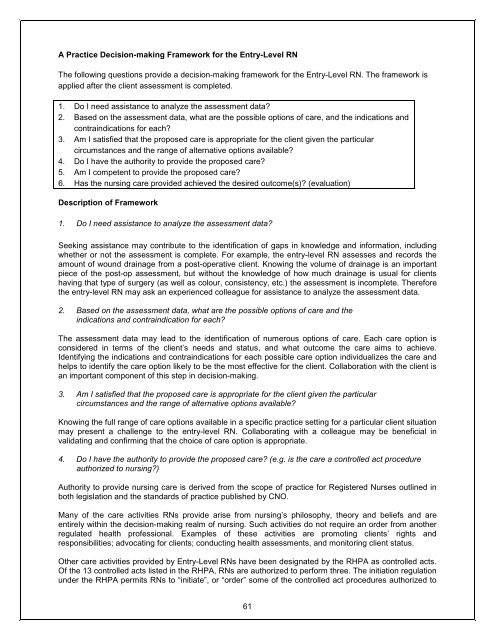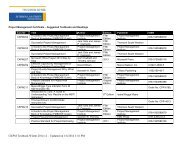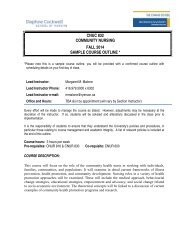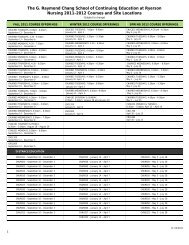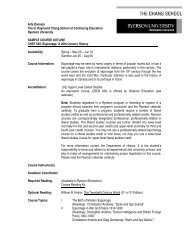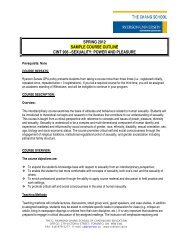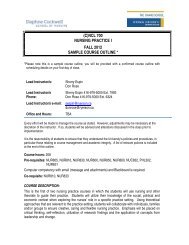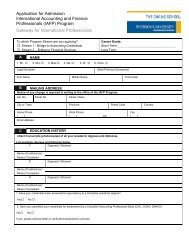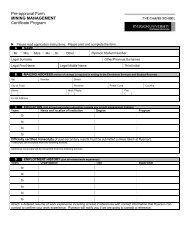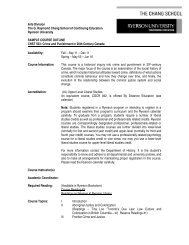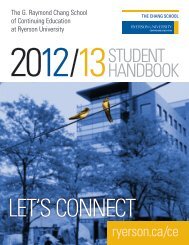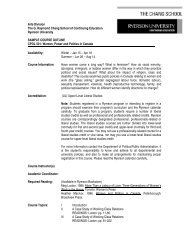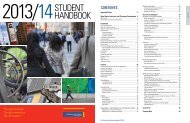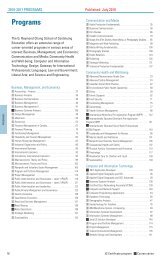School of Nursing - The Chang School - Ryerson University
School of Nursing - The Chang School - Ryerson University
School of Nursing - The Chang School - Ryerson University
You also want an ePaper? Increase the reach of your titles
YUMPU automatically turns print PDFs into web optimized ePapers that Google loves.
A Practice Decision-making Framework for the Entry-Level RN<br />
<strong>The</strong> following questions provide a decision-making framework for the Entry-Level RN. <strong>The</strong> framework is<br />
applied after the client assessment is completed.<br />
1. Do I need assistance to analyze the assessment data?<br />
2. Based on the assessment data, what are the possible options <strong>of</strong> care, and the indications and<br />
contraindications for each?<br />
3. Am I satisfied that the proposed care is appropriate for the client given the particular<br />
circumstances and the range <strong>of</strong> alternative options available?<br />
4. Do I have the authority to provide the proposed care?<br />
5. Am I competent to provide the proposed care?<br />
6. Has the nursing care provided achieved the desired outcome(s)? (evaluation)<br />
Description <strong>of</strong> Framework<br />
1. Do I need assistance to analyze the assessment data?<br />
Seeking assistance may contribute to the identification <strong>of</strong> gaps in knowledge and information, including<br />
whether or not the assessment is complete. For example, the entry-level RN assesses and records the<br />
amount <strong>of</strong> wound drainage from a post-operative client. Knowing the volume <strong>of</strong> drainage is an important<br />
piece <strong>of</strong> the post-op assessment, but without the knowledge <strong>of</strong> how much drainage is usual for clients<br />
having that type <strong>of</strong> surgery (as well as colour, consistency, etc.) the assessment is incomplete. <strong>The</strong>refore<br />
the entry-level RN may ask an experienced colleague for assistance to analyze the assessment data.<br />
2. Based on the assessment data, what are the possible options <strong>of</strong> care and the<br />
indications and contraindication for each?<br />
<strong>The</strong> assessment data may lead to the identification <strong>of</strong> numerous options <strong>of</strong> care. Each care option is<br />
considered in terms <strong>of</strong> the client’s needs and status, and what outcome the care aims to achieve.<br />
Identifying the indications and contraindications for each possible care option individualizes the care and<br />
helps to identify the care option likely to be the most effective for the client. Collaboration with the client is<br />
an important component <strong>of</strong> this step in decision-making.<br />
3. Am I satisfied that the proposed care is appropriate for the client given the particular<br />
circumstances and the range <strong>of</strong> alternative options available?<br />
Knowing the full range <strong>of</strong> care options available in a specific practice setting for a particular client situation<br />
may present a challenge to the entry-level RN. Collaborating with a colleague may be beneficial in<br />
validating and confirming that the choice <strong>of</strong> care option is appropriate.<br />
4. Do I have the authority to provide the proposed care? (e.g. is the care a controlled act procedure<br />
authorized to nursing?)<br />
Authority to provide nursing care is derived from the scope <strong>of</strong> practice for Registered Nurses outlined in<br />
both legislation and the standards <strong>of</strong> practice published by CNO.<br />
Many <strong>of</strong> the care activities RNs provide arise from nursing’s philosophy, theory and beliefs and are<br />
entirely within the decision-making realm <strong>of</strong> nursing. Such activities do not require an order from another<br />
regulated health pr<strong>of</strong>essional. Examples <strong>of</strong> these activities are promoting clients’ rights and<br />
responsibilities; advocating for clients; conducting health assessments, and monitoring client status.<br />
Other care activities provided by Entry-Level RNs have been designated by the RHPA as controlled acts.<br />
Of the 13 controlled acts listed in the RHPA, RNs are authorized to perform three. <strong>The</strong> initiation regulation<br />
under the RHPA permits RNs to “initiate”, or “order” some <strong>of</strong> the controlled act procedures authorized to<br />
61


